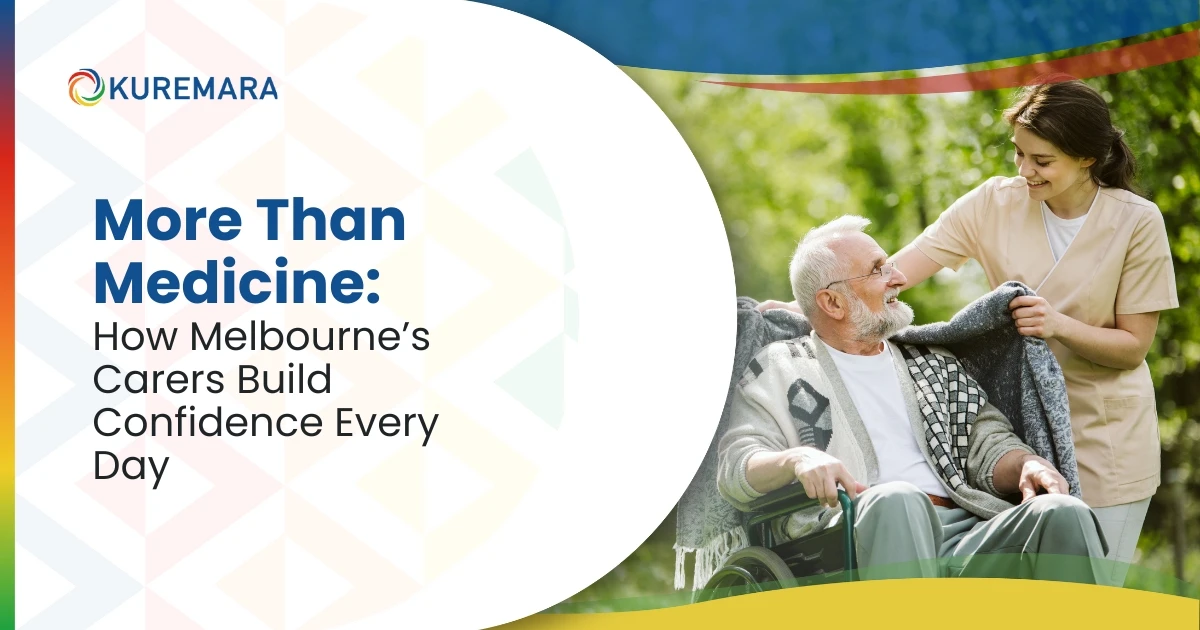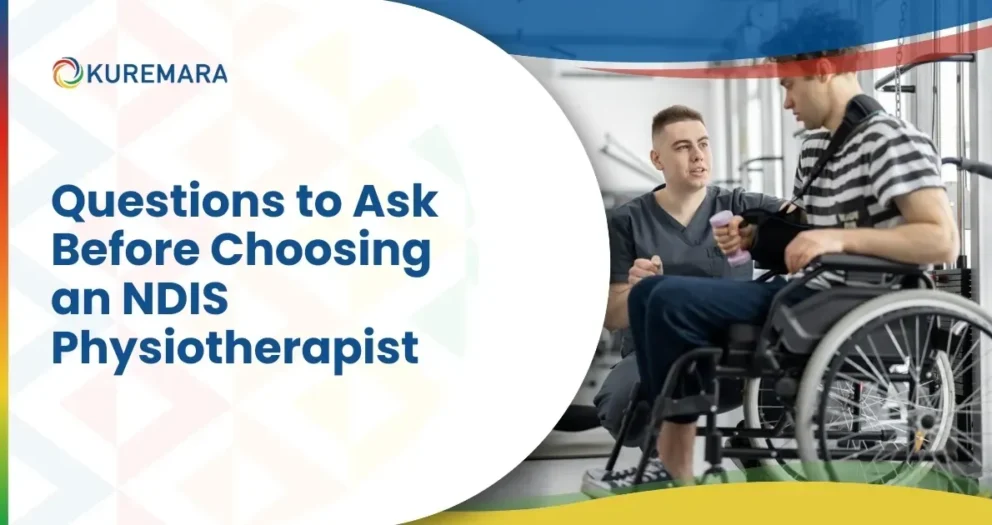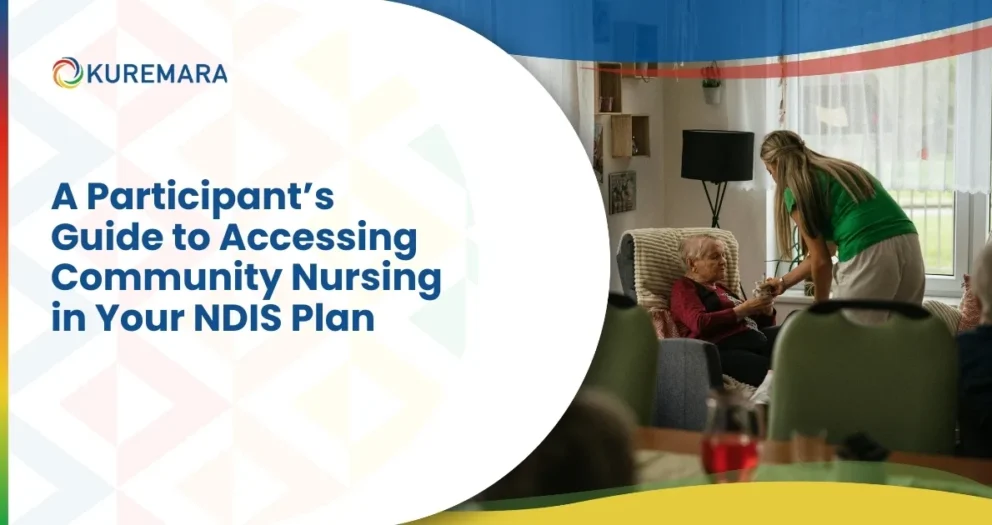Beyond the Prescription Pad: The Real Heart of Care
Every morning in Melbourne, as the city stirs to life, thousands of quiet moments unfold in living rooms and care homes across the suburbs. A carer ties a shoelace, helps brew a cup of tea, or simply shares a smile.
These moments might seem small, but for the people receiving care, they represent something much bigger with confidence, connection, and courage.
In a world where healthcare is often measured in treatments and results, Melbourne’s carers remind us that true wellbeing is built through trust, empathy, and independence. Their work is more than medicine; it’s humanity in motion.
To understand how NDIS support helps people find purpose beyond treatment, explore Expert Assistance for Life’s Journey: Support & Care under the NDIS in Melbourne.
1. Redefining the Role of a Carer
Carers are often seen as helpers, but their role is far richer. They are partners in progress, working alongside participants to build lives filled with purpose and dignity.
In Melbourne, carers go beyond assisting with daily activities; they empower individuals to believe in their own abilities. From supporting mobility and managing medication to encouraging communication and social inclusion, every action reinforces a sense of self-worth.
Tina, a carer in Melbourne’s eastern suburbs, describes it beautifully:
“My goal isn’t just to help someone through the day it’s to make sure they feel proud of what they’ve achieved by the end of it.”
That philosophy aligns with the NDIS framework, which places choice and control at the centre of every participant’s journey. Carers become facilitators of independence, not just service providers.
You can read more about this shift in approach in Breaking Stigma Through NDIS Mental Health Support in Melbourne, which highlights how emotional well-being and confidence go hand in hand.
2. The Confidence Cycle: How Small Wins Create Big Change
Confidence doesn’t happen overnight; it’s built through hundreds of little victories.
Melbourne’s carers celebrate each of these wins with their participants:
-
-
- Encouraging someone to cook their first meal independently.
-
-
-
- Helping them take public transport for the first time.
-
-
-
- Supporting communication through social activities or digital tools.
-
These experiences build a confidence cycle; each small success becomes a steppingstone toward larger goals.
The Confidence Cycle in Action
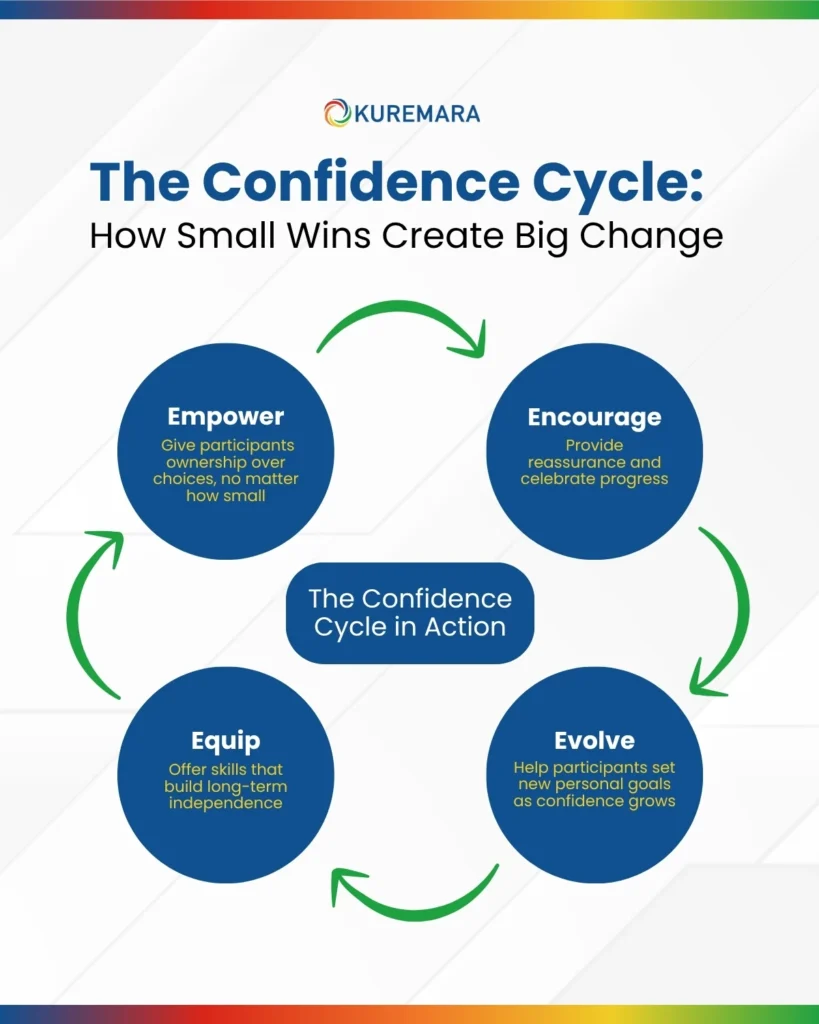
* Empower: Give participants ownership over choices, no matter how small.
* Encourage: Provide reassurance and celebrate progress.
* Equip: Offer skills that build long-term independence.
* Evolve: Help participants set new personal goals as confidence grows.
In Melbourne’s care landscape, these small moments of encouragement create ripples that last a lifetime helping individuals move from dependence to empowerment.
To see how social connection plays a key role in this growth, check out NDIS Social Community Groups in Melbourne: A Comprehensive Guide.
3. Trust: The Foundation of Every Meaningful Connection
Behind every great carer-participant relationship is trust, a foundation that transforms simple care into life-changing support.
Building that trust takes time and emotional intelligence. Carers listen deeply, show consistency, and respect the individual choices of those they support. For participants living with disabilities, that trust becomes a bridge connecting their sense of vulnerability with newfound confidence.
In a city as diverse as Melbourne, cultural awareness and communication skills are essential. Carers often adapt their approach based on language, background, or personality; creating a safe, inclusive environment for everyone.
4. The Emotional Intelligence Behind Excellent Care
What makes Melbourne’s carers so special is not just what they do but how they do it.
Empathy, patience, and emotional awareness are their daily tools. A great carer recognises subtle changes in mood, celebrates unspoken achievements, and helps participants process emotions that might otherwise feel overwhelming.
Three Pillars of Emotional Intelligence in Care
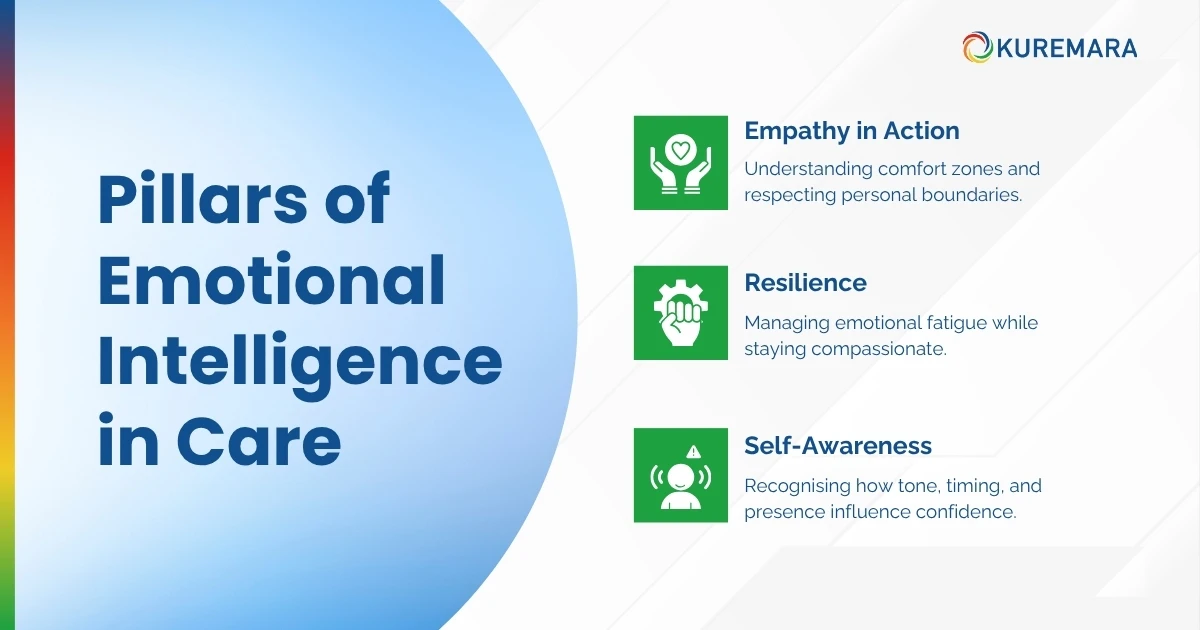
-
-
- Empathy in Action: Understanding comfort zones and respecting personal boundaries.
-
-
-
- Resilience: Managing emotional fatigue while staying compassionate.
-
-
-
- Self-Awareness: Recognising how tone, timing, and presence influence confidence.
-
These soft skills are often overlooked in training programs, but in real life, they make all the difference.
When a carer’s support helps a participant feel seen, heard, and valued, healing becomes emotional as well as physical.
5. Building Independence Through Shared Support
True empowerment lies in shared responsibility where carers guide, but participants lead.
Melbourne’s carers help individuals set achievable personal goals through their NDIS plans, ensuring that care is not about doing for them but with them.
This collaborative model encourages self-sufficiency. For example:
-
-
- A participant may start by practising cooking with supervision and gradually take over meal planning.
-
-
-
- Another may work toward managing appointments independently using reminders or apps.
-
-
-
- Some engage in community events to build social confidence.
-
Technology also plays a role from assistive devices to virtual skill-building sessions, enabling participants to practice independence safely and creatively.
Melbourne’s Caring Culture: A Community That Empowers
Melbourne is home to one of Australia’s most vibrant NDIS networks, where carers, providers, and community organisations collaborate to create opportunities for all.
From inclusive art programs to community gardening and peer-support groups, the city’s initiatives nurture belonging and participation.
Carers often play a key role in connecting participants with these resources, helping them explore interests beyond the walls of healthcare.
This community-first approach transforms lives by blending care with connection allowing participants to flourish not as patients, but as valued members of society.
A Day in the Life: Where Compassion Meets Routine
A day in a carer’s life is a blend of structure and spontaneity.
Mornings may begin with helping a participant get ready for the day. Midday could include supporting therapy sessions or encouraging skill practice. Evenings might be spent sharing a conversation or helping prepare dinner.
But the true essence lies between those moments the laughter shared, the stories exchanged, and the silent reassurance that someone cares deeply.
In those everyday acts, Melbourne’s carers prove that kindness is a form of strength, and that healing often begins with trust, not treatment.
Kuremara’s Perspective: Empowering Confidence, One Participant at a Time
At Kuremara, our mission as an NDIS provider in Melbourne is to make empowerment part of everyday life.
Our carers focus on confidence, independence, and human connection, ensuring participants are not just supported but truly seen.
Whether it’s through Supported Independent Living, Community Access, or Personal Care, our team takes pride in helping individuals reach their goals with dignity and respect.
Because for us, care is not a service it’s a shared journey.
If you’re seeking NDIS Melbourne support that values compassion and confidence, we’d love to help you explore what’s possible.
📍 Explore our Melbourne-based services:
Confidence Is the Real Cure
Medicine can heal the body, but confidence restores the soul.
In Melbourne, carers continue to redefine care not through prescriptions, but through patience; not through procedures, but through presence.
Their compassion transforms lives one small moment at a time, proving that true healing is human.
Every smile shared, every milestone reached, and every step toward independence is a quiet triumph not just for the participant, but for every carer who believes in the extraordinary power of everyday care.
 care@kuremara.com.au
care@kuremara.com.au
